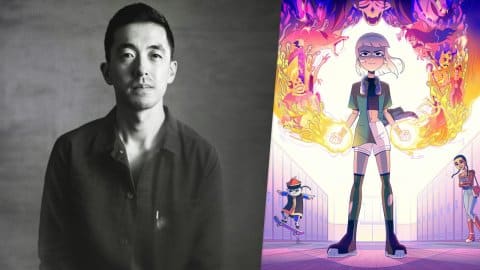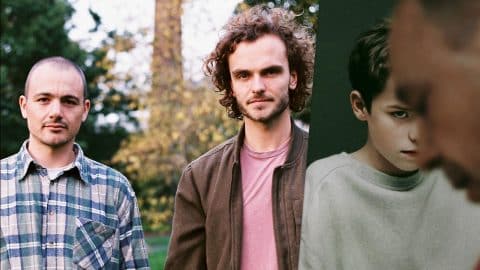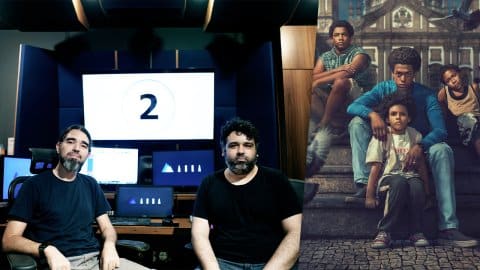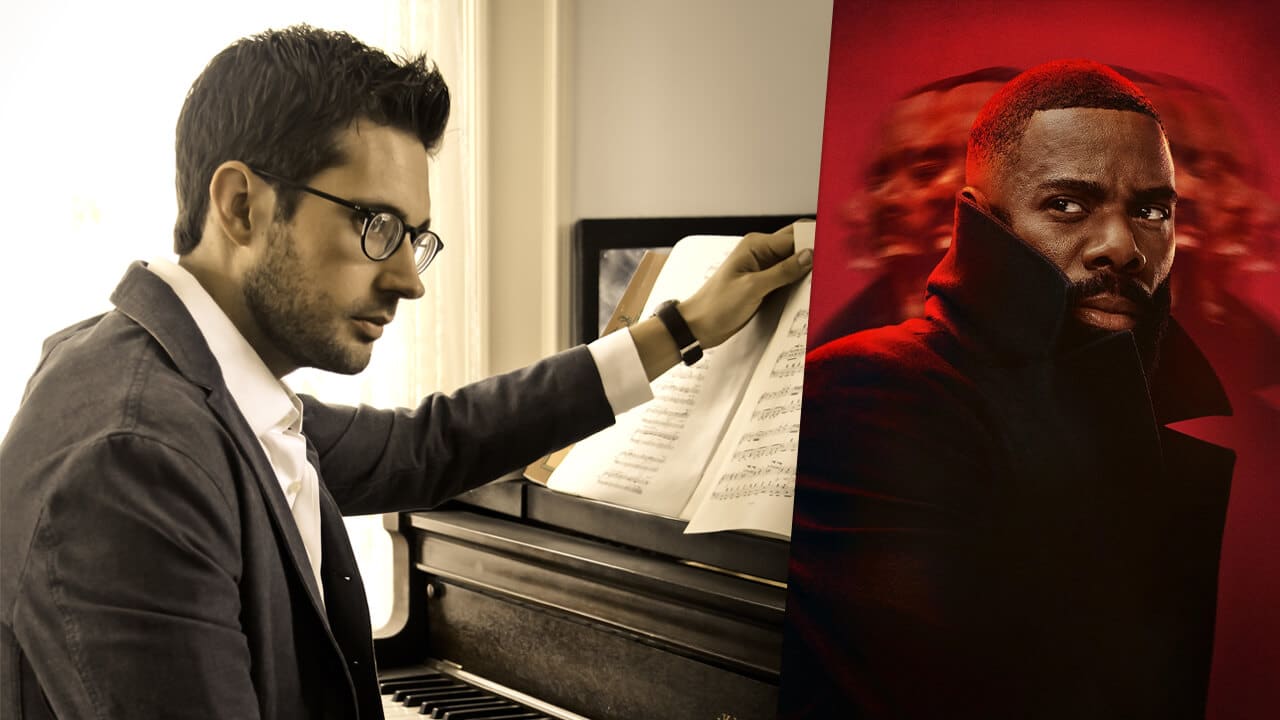
Picture: Philip Klein, the composer of Netflix’s crime thriller The Madness.
Watched by millions worldwide, The Madness, starring Colman Domingo, has been a massive success on Netflix. We recently had the opportunity to discuss the score of the crime thriller with its composer, Philip Klein, whose sound left us on the edge of our seats as Muncie Daniels fought for his innocence.
Philip Klein, composer, and orchestrator, previously composed the score for Netflix’s animated family adventure Wish Dragon. He also composed the score for the American drama Pig starring Nicholas Cage and the historical drama Medieval, amongst others. As an orchestrator, he has worked on movies such as The Fantastic Beasts franchise, Disney’s Turning Red, Raya and the Last Dragon, Jungle, and for Hildur Guðnadóttir’s Academy Award-winning score Joker.
Muncie Daniels (played by Colman Domingo), a popular and highly opinionated media pundit for CNN, fights for his innocence after stumbling across the murder of a white supremacist deep in the woods of the Poconos and framed for the crime.
You can find Philip Klein’s score of The Madness on Spotify.
Jacob: How did you become involved with The Madness?
Philip: Stephen Belber and VJ Boyd had heard the score for Pig a few years ago with Nicolas Cage, and I had co-scored that, and they reached out, which is a composer’s dream in a way because you don’t have to fight for the job, so to speak. I mean, I still had to meet with them, and they interviewed several composers, but we hit it off really early. I think they were kind enough to bring me in very early in the process. They were interviewing people well before editing had even started, so it gave us, you know, a great runway to go off of, but I mean, the short answer is from my work on Pig. That’s how I got involved.
I loved the scripts, too. They sent me the first three scripts, which I thought was really well written. And I knew Coleman [Domingo] was going to be the lead, and it just felt like the scripts were written for him in a way, so to me, it was just a really exciting prospect to work on something like that.
Jacob: I’ve always thought of Colman Domingo as America’s Idris Elba. He’s quite the smooth operator.
Philip: Yeah, especially in this show, too. There’s a swagger to him in the show that’s pretty cool, you know?
Jacob: Hey, the man knows how to wear a suit.
Philip: We know that he wears everything really well.
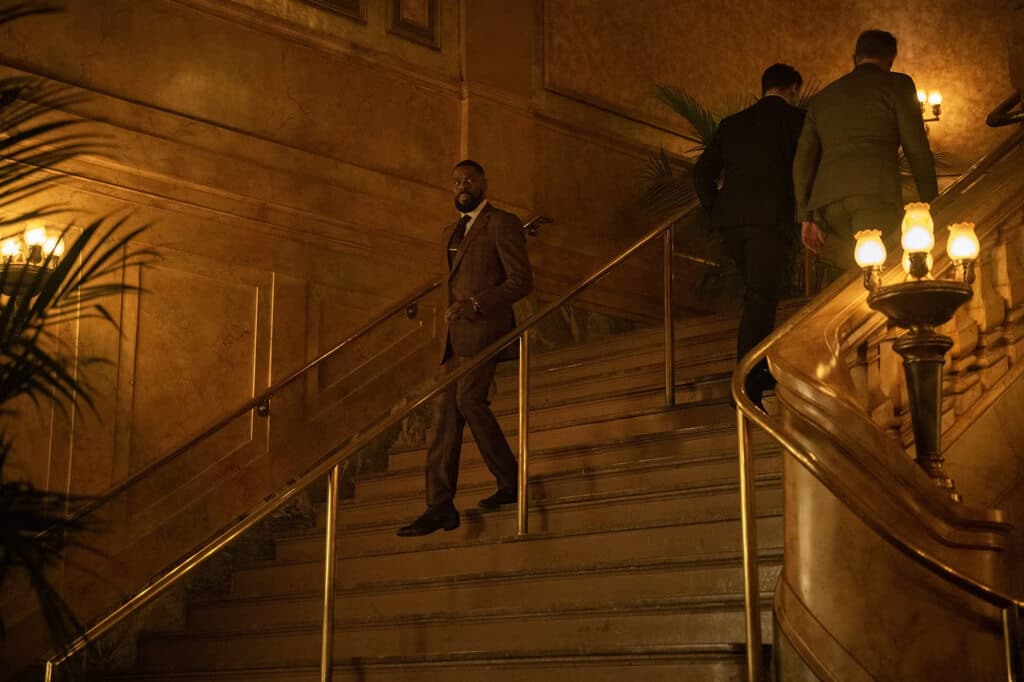
Picture: Colman Domingo as Muncie Daniels in The Madness – Netflix
Jacob: How would you describe your score for the series?
Philip: You know, when we started, there was a lot of discussion and questions on how we were going to approach this because it has a bit of that Hitchcockian 70s thriller vibe from Klute, All the President’s Men, Three Days of the Condor. There’s this paranoia and political thriller going on, and those scores were generally pretty jazz-heavy scores. We explored that, and I think elements of the score have jazz in it. But we found that it was maybe pushing a little too far into the gumshoe noir territory and sounding a little too old-fashioned. So, what we kind of settled on was elements of jazz in a more modern setting. And I think the pitfall to scoring thrillers and paranoia stuff is to just beat the audience over the head with dark, dread music, you know? And that was something we were pretty conscious of. For me, in particular, I love to write thematic scores because I think if you can write a good thematic identity for a situation, a character, a relationship, or something that you can tie it to in a project, it draws the audience into the character more. It makes them invest quite a bit more into that character.
So I think what I’m proud of on this score is that the score is not just suspense jazz. There’s a really strong sense of melodicism and lyricism to the score. A pretty recognizable theme plays quite a bit throughout the score whenever Coleman Domingo’s doing something or discovering something. So I think it’s a cool balance between the suspense, but there’s also this really strong melodic thing going on and paired with that jazz kind of undertone through it all.
Jacob: The music definitely made me want to watch more. I stayed up later than I should have done to keep watching it. I started at around nine in the evening and then found myself in the early hours of the morning five or six episodes into the series.
Philip: Yeah, yeah. The sixth episode is a really good one, too. I mean, it’s when John Ortiz’s character kind of focuses on him, you know, and that kind of shock ending that happens. But yeah, no, I mean, the dangers of streaming and binging, you know, it really sets you up for that.
Jacob: Certainly, during those earlier episodes, one of the pieces I particularly liked was Paranoia Sets In. As an audience member, I certainly felt that paranoia on behalf of Muncie Daniels.
Philip: Oh, great! It’s there’s like a four-note and then another four-note, kind of little motif that happens, and that is tied to Julia Jane’s character at the end. It’s like all these little Easter eggs, and, as I say, we’re planting seeds at the beginning of it. Then they grow and sprout at the end as you hear this thing blown up and much louder every time you see her. That’s when you realize that, like, the con is being set, that paranoia is being set up early on in those episodes, and yeah, again, it’s just something we tried to do.
I mean, I’ve always felt that suspense is kind of in music should almost feel like you’re holding your breath, you know, and you want that feeling of holding it maybe a little longer than you’re comfortable doing, and you start to panic on the inside.
When we could do that musically, what ended up happening was that we finally did let the theme come go. It was like everyone let their breath out and was like, “Oh, thanks.” So it created a really cool arc in the show, like everybody kind of tenses up, and then you let it go, and then you tense back up, and you let it go, and you can sort of play with how an audience feels during those moments.
Jacob: I think that’s the perfect way to describe it because that is precisely how I felt watching it. Muncie experiencing those moments of panic, and I genuinely thought to myself, “Oh! It’s like you are struggling to breathe.”
Philip: It’s like the walls are caving around you, and you’re being squeezed, right?
Jacob: There were so many different directions the show could have gone, and at first, I thought we were going down the route of Muncie being the unreliable narrator; you know, he’s being gaslit so much, and he’s meant to be a “good” man, but maybe he did do it? So, I thought the music helped pave the way for not knowing where this story is going.
Philip: Yeah, It’s hard when you work on series work, right? Because you have to think ahead, you know, all the time. And sometimes, you don’t even have access to that material yet. So you’re almost not sure what it will look like in episode five, but I know that that’s the landing point for this particular storyline. So we’re going to start, like I said, planting those seeds now and hoping that they’ve grown by the time we get to five. And that can be difficult. It takes a lot of communication between the showrunners and yourself to plot those foundation points.
Jacob: What was it like working with showrunners Stephen and VJ?
Philip: They were great. Every experience is different with showrunners, directors, and producers, and some of them will openly admit that they know just enough about music to be dangerous, and others are a bit more I don’t want to say hands off, but they allow you to do your thing and, and trust you. That was a bit more of this case. Steve said, “You’re the composer; we heard you for a reason. So do what you think is best.” And then they react to what you’ve made, and how does that make them feel? And, when you’re given that freedom as a composer, you feel more open to experimenting and more open to stepping out of your comfort zone and exploring a particular sound.
We did some pretty cool, weird sonic things, like in that Paranoia Sets In track, and I had always wanted to explore that. So then this project came along, and I thought it would be cool to do it on this project. It would fit really well. Stephen was always just like, “You know, I think it’s really cool, let’s do this,” but “Let’s not forget that we need a theme. We need an identity for Muncie.” There was a moment when he came over to the studio one time and early in the process. And I had mostly just been doodling, some sonic ideas for them and just worlds, not necessarily specific thematic things, but I had found this theme that fit Muncie well. He sat down on the couch, and I just listened to this. So I played it for him, and he said, “That’s Muncie, that Muncie Daniels, you don’t need to look any further, that’s the sound.” As a composer, you rarely get that kind of direct feedback. But to get that response, I felt a bit like I had cracked the puzzle, at least that part of the puzzle for the show.
I knew that was a big piece because we spent so much time from Muncie’s point of view, and especially the first episodes entirely from his point of view. So, it was important to find that idea for the showrunners. They were very open to creating a safe space for me, which I appreciated because it made it easier to discuss. “I like it, but it’s not right,” they felt safe enough to say stuff like that to me, and they were also comfortable enough to say, “Go do your thing. And let’s talk about it in a couple of weeks when you have a batch of material to go through.” So, it was great. I would do it again in a heartbeat.
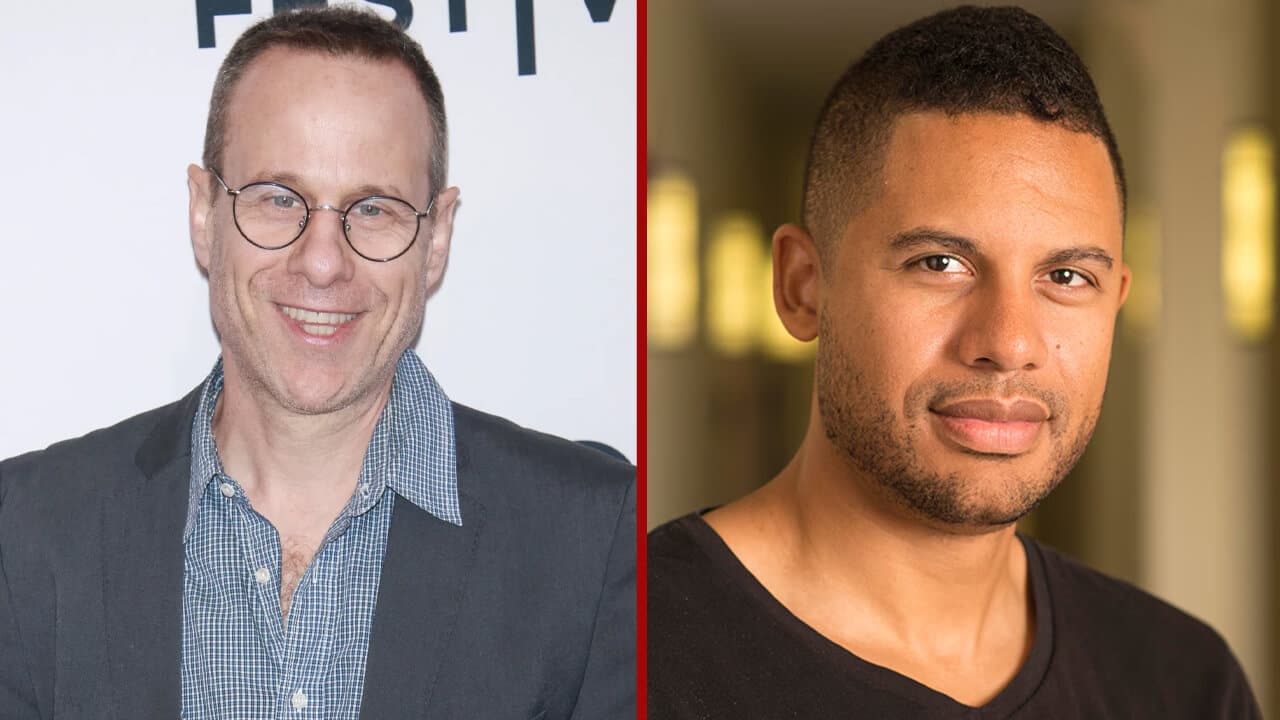
Picture: Stephen Belber and VJ Boyd the showrunners of The Madness.
Jacob: It sounds like there was a collaborative effort between you and them that gave you the freedom to experiment.
Philip: Yeah. Early on in my process, I tend to beat myself up until I find an angle, sound, or thematic idea. I go through all the stages of grief when it comes to starting a project. You know, you’re super excited to start it and you’re thrilled by the content or the situations or the stories or the characters, but you also have to have to get into that world, you know, and sometimes that’s easier. You find something quickly, and it gets you going, and other times, it doesn’t. But one of the ways I usually do it is to start talking to a lot of musicians that I think could create sonic, you know, ideas for the score. Like this one, it was a trumpet, a piano, the flute, the saxophone, kind of interesting, jazzy instruments in their own right.
We started kind of using them in weird ways and recording what I call toolkits, little boxes of goodies for each one of them. And that starts to get my brain going in a certain direction. Then I’ll hear a little motif or something, and I go, “Oh, that would be cool if we tried it over this sequence.” Then, that inspires me more. So they [the showrunners] were very keen on allowing me to do that, and I had a lot of time on this show, too, because it was in the middle of the strike. So we had a huge runway until we started scoring to picture this year and so it was a lot of fun.
There are key clicks in the Paranoia track you called out, and so much of the show is Muncie on the run, right? So he’s out of breath and there’s a flute player who can bring this sound like they’re trying to catch their breath all the time while playing, it’s persistently in the background. Then there’s a saxophone going up and down, and the saxophone player’s motion to go up and down the instrument creates this clicky, nervous, and jittery sound. So we tried to find toolkits of ideas for those moments because it made us uncomfortable as you were listening to it, and on top of the thematic idea we had, it was always like the two parts lived in dichotomy to each other.
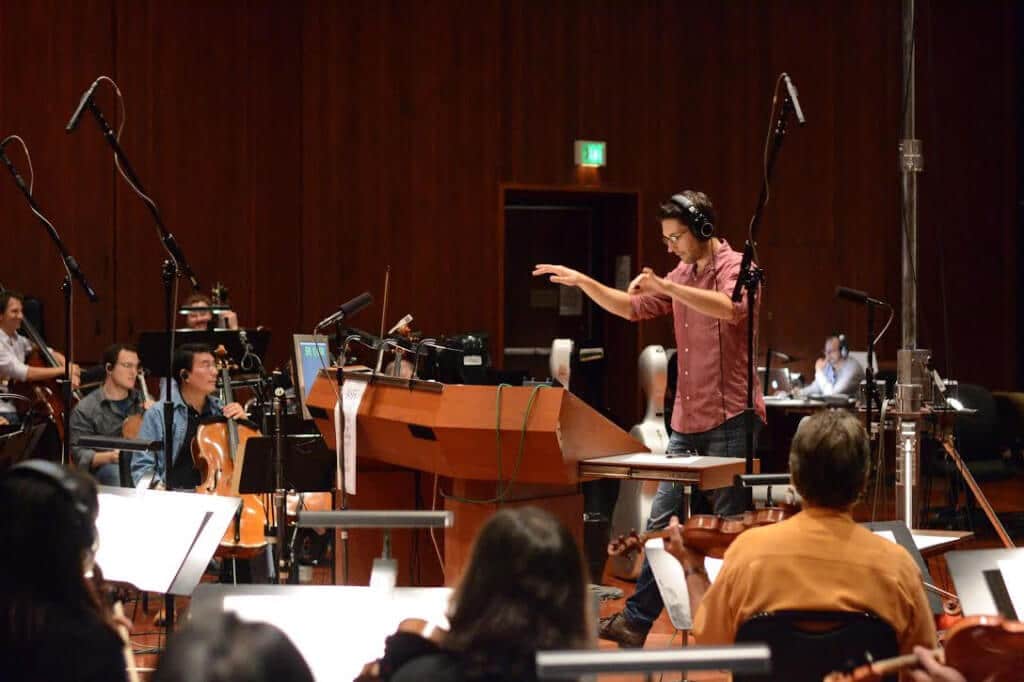
Pictured: Philip Klein is highly regarded for his work as an orchestrator.
Jacob: I think those Jazz elements to the score work perfectly for Muncie. He gives me the impression that he is probably a jazz guy.
Philip: I remember early on, when we were first starting there, there were more needle drops and more licensed things of some actual jazz in the score. Then it somewhat shifted into Philadelphia R&B, you know, soul and rap elements. But I think the idea was that you could see this guy coming home at night, putting on a jazz record, and having a scotch. There was that vibe to him, and I wanted to honor that.
In a way, I’m glad they didn’t end up licensing any of it because I think it would have almost, maybe, caused conflict between the score and the licensing. It was nice that they lived in different worlds. The score and the licensed tracks. But it was a cool identity for Muncie, and I think Philadelphia is ripe with that R&B and jazz scene, so it made sense musically and geographically for us to go in that direction.

Pictured: Philip Klein (center) the composer of The Madness
Jacob: With the piece of music I picked out earlier, am I wrong in saying there’s a piano in the background as if someone is slamming on a piano but almost out of key?
Philip: We did a whole session with a prepared piano, creating pulses and stuff from the strings. But yeah, it’s not slamming the keys as much as it is slamming the pedal down, and you might get really close. Because if you slam the damper pedal on a piano down, it slams everything down on top of itself, but you really have to do it hard because it’s not meant to do that. So like it opens the strings and cuts them off, creating this yup sound, which we then put a delay on it.
We were always trying to find the different elements of what panic meant to a person musically. There’s that feeling of like your heart racing, it feels very internal and deep. Then, the added key clicks feel like the jittery kind. You can’t sit still. You then add the flute, which is like the breath, and we added more flutes, too, for really high whistle tones, which is when the instrument is barely played, creating this windy whistle, which to me felt like a ringing in someone’s ears like when something really bad happens and it’s like all the sound goes out of your head, and you go into this internal sense of “what’s going on?” and “How am I gonna fix this?” so we were always trying to find the music equivalent to that feeling inside somebody.
It was great fun. You don’t always get to do stuff like that. Sometimes, it’s pretty straightforward, and that’s what you get on with. But this time, you could dig in and do some fun things.
Jacob: what are you working on next?
Philip: I’m doing a small rom-com right now, which is an independent thing. I do a lot of orchestration too, so I’m working on a few orchestration things, but the bigger things I can’t necessarily speak about yet because it’s early on in the process. But yeah, I’m hopeful that this opens up a couple more doors with Netflix. I think it went really well, and they were pleased, and I was thrilled to be over there. And I think Netflix is making some really cool content. It’s an exciting place to be a part of and be part of that world now.
So we’ll see. I’m always open to anything. I think the exciting part of being a composer is that every adventure is a new adventure.
Did you enjoy the score of The Madness? Let us know in the comments below!


